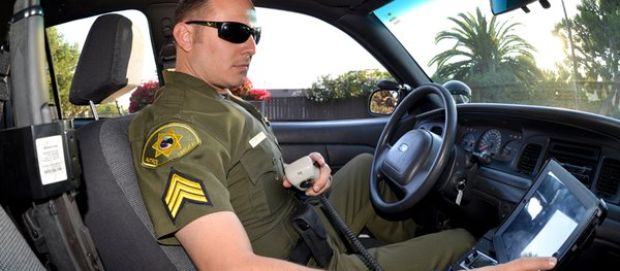
Malibu residents rely on the LA County Sheriff’s Department for its law enforcement services; however, some may be asking if there is a new sheriff in town. Malibu Patrol, an armed security company hired by homeowners, businesses, schools and cities, including the City of Malibu, is prepared to do whatever is appropriate to serve and protect its clients. This includes making citizen’s arrests, using weapons or force, when required.
Some, however, believe the services of Malibu Patrol, whose corporate name is Gates Security, could violate a person’s civil rights.
Doug Kmiec, a professor of constitutional law at Pepperdine University, said that making citizen’s arrests is generally not favored because it involves the deprivation of liberty, which can easily escalate into a broader conflict.
“A security patrol company is walking a very thin blue line in making a citizen’s arrest with potential force,” said Kmiec. “The law may allow for it, but people should avoid it at all costs because it involves making serious judgments which could be hard for someone who doesn’t have a lot of experience with certain situations.”
Scott Wagenseller, the founder and CEO of Gates Security, disagrees. He sees it as a matter of doing the right thing.
“The perspective from the ivory tower is always comforting and safe, but on the street is a whole different matter. We are here and are prepared to protect,” Wagenseller said, adding that his business has never had a complaint or lawsuit filed against it resulting from its patrol work.
In 2010 the city hired Malibu Patrol to secure access gates each night at sunset at Trancas Park and quietly clear the park of patrons before the park closed, due to concerns from neighboring residents. The Malibu City Council voted to approve a three-year extension to the agreement last July, at an annual cost of approximately $10,000.
Malibu City Manager Jim Thorsen states that it is not cost-effective for city staff to close the park each night, and the city’s annual $6.4 million agreement with the sheriff’s department does not cover the service.
“The sheriff’s department will not open and close the gates,” Thorsen said.
Founded in 2001 in the Pacific Palisades, Gates Security provides “full security services” for clients in the Palisades, Agoura, Westlake Village, Thousand Oaks, Newbury Park and Malibu, according to the company’s website. In Malibu it operates under the title of Malibu Patrol.
Malibu Patrol touts itself as different from most security companies because they are a Private Patrol Operator (PPO), Certified Firearms Training Facility, and provide “intervention-level services,” unlike most security and alarm companies in the state. They also make citizen’s arrests, which are legal under California’s Penal Code if a “public offense” is committed in one’s presence.
“We will use any force necessary that is appropriate and in the best interest of our clients,” Wagenseller said in an interview with The Malibu Times. “If any of our security officers witness a crime against our client or [a citizen], we will use whatever force we feel is needed to detain that person and make a citizen’s arrest.”
Officials with the Malibu/Lost Hills Sheriff’s Station declined to comment on Malibu Patrol’s work, including its practice of citizen’s arrests. “We don’t have any comment on the practices of any particular private security company; however, we support all private security in their role and in their effort to deter crime,” said Lt. James Royal. Requests for comment from station Capt. Pat Davoren were declined.
All security officers are required to meet the basic requirements of a 40-hour certified training course from the State of California Bureau of Security and Investigative Services (BSIS).
In addition to the basic training, all of the armed security officers at Malibu Patrol have had some sort of Peace Officers Standards and Training (POST), although it is not a requirement for licensing as a security guard or for employment at Malibu Patrol.
Wagenseller maintained that all his armed security officers have this type of Peace Officer standards training, so he is confident they are ready to make critical judgements and their actions will be appropriate and in the best interests of their clients.
However, Professor Kmiec believes such a proactive approach could result in a conflict of interest if a dispute were to arise between a client of the security service and another citizen.
“You can’t have one standard for one person and not the other because they didn’t hire you,” said Professor Kmiec. “The [public] police force, as one would expect, applies standards evenly under state statute, not under a contract client relationship where a company puts the needs and best interests of their clients first.”
Wagenseller believes that due to limited public safety resources and extended response times, their intervention on behalf of their clients is invaluable and the reason homeowners and businesses are using them.
“Basically, we are servant leadership,” says Wagenseller. “We are out patrolling everyday, but it does not mean that we are enforcing the law everyday.”




